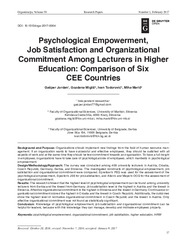Please use this identifier to cite or link to this item:
https://rfos.fon.bg.ac.rs/handle/123456789/1658| Title: | Psychological Empowerment, Job Satisfaction and Organizational Commitment Among Lecturers in Higher Education: Comparison of Six CEE Countries | Authors: | Jordan, Gasper Miglić, Gozdana Todorović, Ivan Marić, Miha |
Keywords: | psychological empowerment;organizational commitment;job satisfaction;HRM;higher education | Issue Date: | 2017 | Publisher: | Walter De Gruyter Gmbh, Berlin | Abstract: | Background and Purpose: Organizations should implement new findings from the field of human resource management. If an organization wants to have successful and effective employees, they should be satisfied with all aspects of work and at the same time they should be feel commitment towards an organization. To have a full insight in employees, organizations have to take care of psychological side of employees, which manifests in psychological empowerment. Design/Methodology/Approach: The survey was conducted among 409 university lecturers in Austria, Croatia, Czech Republic, Germany, Serbia, and Slovenia. The investigated constructs of psychological empowerment, job satisfaction and organisational commitment were compared. Spreitzer's PEG was used for the assessment of the psychological empowerment, Spector's JSS for job satisfaction, and Allen's and Meyer's OCQ for the assessment of organisational commitment. Results: The research showed that the highest level of psychological empowerment can be found among university lecturers from Serbia and the lowest from Germany. Job satisfaction level is the highest in Austria and the lowest in Slovenia. Affective organisational commitment is the highest in Slovenia and the lowest in Germany. Continuance organisational commitment scored the highest in Croatia and the lowest in Czech Republic. Additionally, the outcomes show the highest level of normative organisational commitment in Czech Republic and the lowest in Austria. Only affective organisational commitment was not found as statistically significant. Conclusion: Knowledge of psychological empowerment, job satisfaction and organizational commitment can be helpful for leaders, because with this knowledge they can manage, develop and motivate employees properly. | URI: | https://rfos.fon.bg.ac.rs/handle/123456789/1658 | ISSN: | 1318-5454 |
| Appears in Collections: | Radovi istraživača / Researchers’ publications |
Show full item record
SCOPUSTM
Citations
29
checked on Nov 17, 2025
Page view(s)
2
checked on Dec 28, 2025
Download(s)
2
checked on Dec 28, 2025
Google ScholarTM
Check
Altmetric
This item is licensed under a Creative Commons License


